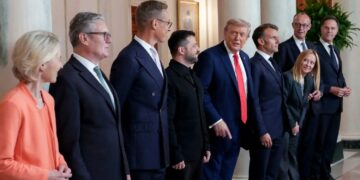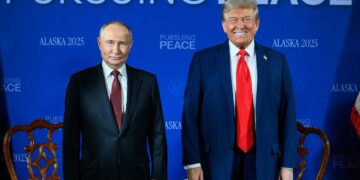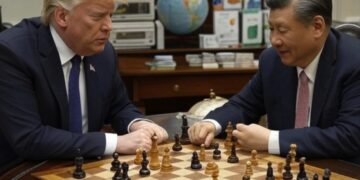The term “Nazism” evokes images of swastikas and the racial ideologies of Hitler, Mussolini, and Franco. Yet, Professor Musa Elashkham argues that this narrow view, shaped by Western media, think tanks, and policymakers, obscures a broader form of domination: the elevation of one nation’s citizens over others, regardless of ethnicity. This “hidden Nazism,” cloaked in democratic rhetoric, has defined colonial and modern geopolitical practices, demanding scrutiny from stakeholders—policymakers, academics, and activists alike.
Elashkham contends that Western elites have deliberately tied Nazism to overt racism, limiting it to historical figures while ignoring its roots in the word “nation.” Nazism, he argues, is the tendency to prioritize one country’s citizens over others, a practice embedded in the colonial invasions of Western empires and perpetuated today through subtler means. As stakeholders, we find this redefinition compelling but provocative. The term “Nazism” carries heavy historical weight, and applying it to modern geopolitics risks oversimplification. Still, the core idea—that powerful nations assert superiority over weaker ones—resonates deeply and calls for action.
Elashkham distinguishes between blatant racism, or explicit racial superiority mislabeled as Nazism, and hidden Nazism, a national superiority disguised as pluralism. Colonialism, he asserts, is the starkest example, where empires justified conquest by deeming their citizens superior to those of the invaded nations. Modern Western democracies continue this through policies that undermine weaker states’ sovereignty, such as interventions in Iraq or Libya framed as “spreading democracy” but often serving Western interests. We see merit in this view, though the blanket use of “Nazism” may obscure other motives like economic gain or strategic control, which stakeholders must also address.
This national superiority manifests in various ways. Powerful nations justify global interventions, like U.S. actions in Somalia, as vital to their security while dismissing weaker states’ concerns. They extend influence into neighboring countries’ territories under the guise of security zones. Liberation movements in former colonies are branded as terrorism, while similar efforts by powerful nations are celebrated. Terrorist designations become tools to pressure weaker states into compliance, and sanctions force former colonies to prioritize powerful nations’ interests. Immigration policies in nations built on migration, like certain U.S. approaches, expel newer arrivals, reflecting a hierarchy of belonging. Powerful states shield their citizens from international courts while prosecuting others, and they impose Western political and social systems on weaker nations through interventions or revolutions. These practices reveal a global hierarchy, but we caution that “Nazism” may be too loaded a term. Stakeholders might consider “hegemonic nationalism” to foster dialogue without alienating audiences.
Historically, Elashkham links these practices to slavery, comparing Western empires’ treatment of former colonies to the Umayyad and Abbasid dynasties’ handling of freed slaves—nominally free but not equal. Post /-Cold War interventions, often justified as humanitarian, reasserted Western control over former colonies. While this parallel is striking, local resistance and agency in these nations complicate the narrative of Western dominance, a nuance stakeholders must consider.
To counter these practices, Elashkham calls for exposing hidden Nazism and uniting weaker nations. We propose that stakeholders amplify inequities with data from organizations like the UN, foster regional alliances like the African Union, reform global institutions for fair representation, and back cultural movements in former colonies to resist imposed systems. These steps require collaboration among policymakers, NGOs, and grassroots movements to dismantle systemic hierarchies.
Elashkham’s redefinition of Nazism as national superiority challenges us to see global power dynamics anew. For stakeholders, this is a call to confront the subtle ways powerful nations maintain dominance, from sanctions to selective justice. By exposing these practices and fostering global solidarity, we can work toward a world where no nation’s citizens are deemed superior. The question remains: will you lead the charge?
Elashkham contends that Western elites have deliberately tied Nazism to overt racism, limiting it to historical figures while ignoring its roots in the word “nation.” Nazism, he argues, is the tendency to prioritize one country’s citizens over others, a practice embedded in the colonial invasions of Western empires and perpetuated today through subtler means. As stakeholders, we find this redefinition compelling but provocative. The term “Nazism” carries heavy historical weight, and applying it to modern geopolitics risks oversimplification. Still, the core idea—that powerful nations assert superiority over weaker ones—resonates deeply and calls for action.
Elashkham distinguishes between blatant racism, or explicit racial superiority mislabeled as Nazism, and hidden Nazism, a national superiority disguised as pluralism. Colonialism, he asserts, is the starkest example, where empires justified conquest by deeming their citizens superior to those of the invaded nations. Modern Western democracies continue this through policies that undermine weaker states’ sovereignty, such as interventions in Iraq or Libya framed as “spreading democracy” but often serving Western interests. We see merit in this view, though the blanket use of “Nazism” may obscure other motives like economic gain or strategic control, which stakeholders must also address.
This national superiority manifests in various ways. Powerful nations justify global interventions, like U.S. actions in Somalia, as vital to their security while dismissing weaker states’ concerns. They extend influence into neighboring countries’ territories under the guise of security zones. Liberation movements in former colonies are branded as terrorism, while similar efforts by powerful nations are celebrated. Terrorist designations become tools to pressure weaker states into compliance, and sanctions force former colonies to prioritize powerful nations’ interests. Immigration policies in nations built on migration, like certain U.S. approaches, expel newer arrivals, reflecting a hierarchy of belonging. Powerful states shield their citizens from international courts while prosecuting others, and they impose Western political and social systems on weaker nations through interventions or revolutions. These practices reveal a global hierarchy, but we caution that “Nazism” may be too loaded a term. Stakeholders might consider “hegemonic nationalism” to foster dialogue without alienating audiences.
Historically, Elashkham links these practices to slavery, comparing Western empires’ treatment of former colonies to the Umayyad and Abbasid dynasties’ handling of freed slaves—nominally free but not equal. Post /-Cold War interventions, often justified as humanitarian, reasserted Western control over former colonies. While this parallel is striking, local resistance and agency in these nations complicate the narrative of Western dominance, a nuance stakeholders must consider.
To counter these practices, Elashkham calls for exposing hidden Nazism and uniting weaker nations. We propose that stakeholders amplify inequities with data from organizations like the UN, foster regional alliances like the African Union, reform global institutions for fair representation, and back cultural movements in former colonies to resist imposed systems. These steps require collaboration among policymakers, NGOs, and grassroots movements to dismantle systemic hierarchies.
Elashkham’s redefinition of Nazism as national superiority challenges us to see global power dynamics anew. For stakeholders, this is a call to confront the subtle ways powerful nations maintain dominance, from sanctions to selective justice. By exposing these practices and fostering global solidarity, we can work toward a world where no nation’s citizens are deemed superior. The question remains: will you lead the charge?









































